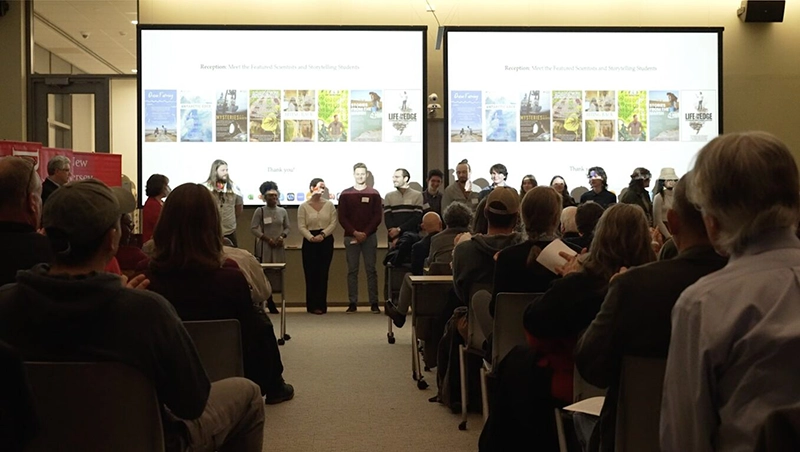Have you ever wondered what steps Rutgers science teams take to understand and solve complex environmental challenges?
Rutgers alumni and friends were treated to a screening of original short science-in-action stories featuring SEBS scientists on November 28 at the New Jersey Institute for Food, Nutrition, and Health. This event gave 160 audience members a front-row seat to some of the School of Environmental and Biological Sciences (SEBS) and New Jersey Agricultural Experiment Station (NJAES) scientists’ work that is making an impact around the world.
The eight science stories featuring research from New Jersey’s food systems and aquatic ecosystems were all produced at Rutgers with the creative collaboration of undergraduate students under the storytelling leadership of Dena Seidel, research analyst in the Department of Plant Biology.
These stories communicate the scientists’ passion for their work and their interdisciplinary scientific process including investigations at active hydrothermal vents in the Pacific Ocean. This cutting-edge SEBS research included:
- Fields of Devotion (Plant Breeding, Food Security and Climate resiliency)
- Ocean Farming (Aquaculture and Food Security and Climate resiliency)
- Mysteries of 9° North (Deep Sea Microbiology at Hydrothermal Vents)
- Amaranth (Culturally Preferred Traditional Vegetables, Food Security)
- Antarctic Edge: 70° South (Antarctic Climate Science)
- Life on the Edge: Horseshoe Crabs (New Jersey’s Horseshoe Crab Migration)
- Stories from the Marsh (Climate Change’s Impact on New Jersey’s Fish Population)
- Biting Back (Developing Plant-Based Insect Repellent to Protect Against Disease in a Changing Climate)
Interdisciplinary science and teamwork were clearly on display, and many said the event was both educational and inspiring and brought them a sense of pride in Rutgers research and local and global impact.
“I love your science storytelling project. The [stories] provide a wonderful view into the exciting projects and collaborations available to students, staff, and faculty at Rutgers. [They] tell interesting, inspiring stories succinctly and I’m sure prospective students and people around the state would really enjoy them,” said Lindsey Kayman, president, Environmental Education Fund (Rutgers College ’81, Chemistry).
Full article at Rutgers NJAES Newsroom

